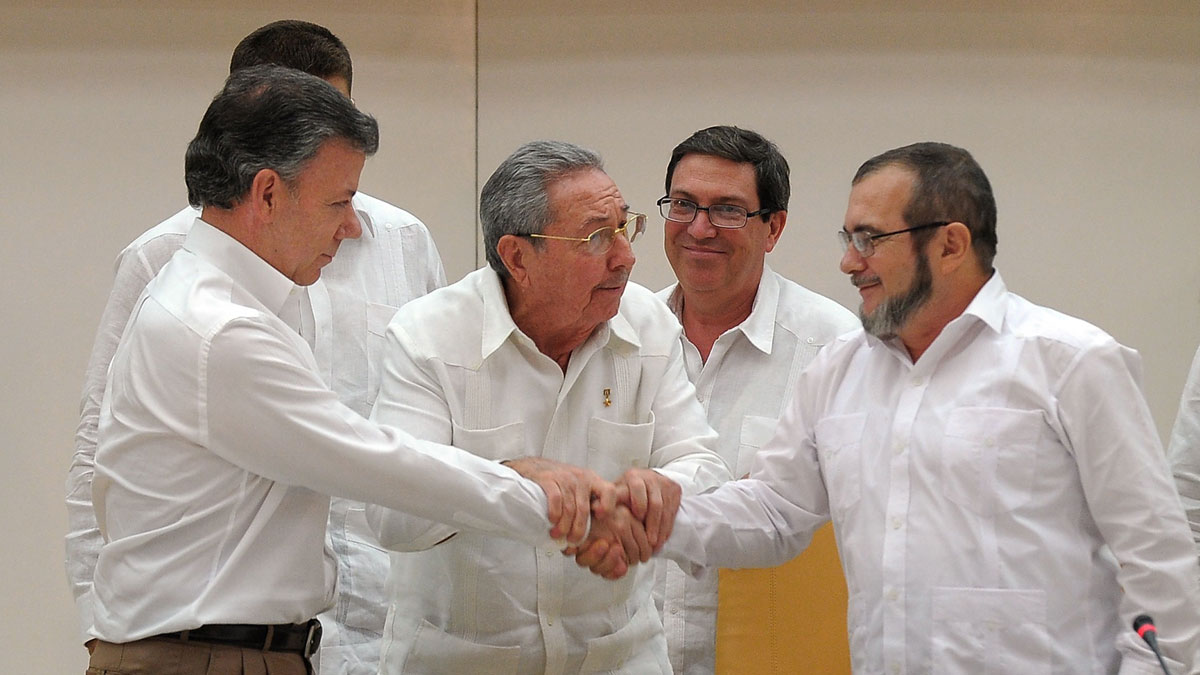Colombian President Juan Manuel Santos wins Nobel Peace Prize
Committee honours politician's efforts to agree a peace deal with Farc rebels after 52-year conflict

A free daily email with the biggest news stories of the day – and the best features from TheWeek.com
You are now subscribed
Your newsletter sign-up was successful
Colombian President Juan Manuel Santos has been awarded the 2016 Nobel Peace Prize for his efforts to draw his country's five-decade conflict with Farc rebels to a close.
He will receive a medal, a diploma, the title of Nobel Laureate and a financial award worth about £735,000.
Judges on the Nobel committee in Norway praised his efforts to agree a peace deal with Farc rebels, signed last month after a four-year negotiations period.
The Week
Escape your echo chamber. Get the facts behind the news, plus analysis from multiple perspectives.

Sign up for The Week's Free Newsletters
From our morning news briefing to a weekly Good News Newsletter, get the best of The Week delivered directly to your inbox.
From our morning news briefing to a weekly Good News Newsletter, get the best of The Week delivered directly to your inbox.
The deal was rejected by Colombians in a referendum last weekend, but the committee said it hoped the prize would "give [Santos] strength to succeed in this demanding task" and that the Colombian people will "reap the fruits of the reconciliation process" in years to come.
An estimated 260,000 people have died during the 52-year conflict, with more than six million people internally displaced. Santos's negotiations had "brought the bloody conflict significantly closer to a peaceful solution", said the Nobel judges.
Here are some of the other individuals and groups believed to have been in contention for this year's Nobel Peace Prize:
Syria's White Helmets
A free daily email with the biggest news stories of the day – and the best features from TheWeek.com
The White Helmets are a group of 3,000 volunteers who put their lives in harm's way to save Syrians on a daily basis. Named after the colour of their headwear, the group includes men and women from all backgrounds – including some of the country's most accomplished thinkers.
"What the White Helmets accomplish may seem like a drop in the ocean, but what they represent is immense: resilience and bravery in the face of barbarism," says The Guardian.
Svetlana Gannushkina
Prominent Russian human rights activist Svetlana Gannushkina's Civic Assistance Committee provides legal help, aid and education to migrants and refugees and says it has helped more than 50,000 people since 1990.
However, Civic Assistance was last year labelled a "foreign agent" by the Russian government and experts say giving Gannushkina the prize might have led to a backlash from Moscow.
The Pope would have been the first ever leader of the Roman Catholic Church to win the prize. The pontiff has called for world action on the refugee crisis and helped rescue 12 Muslim refugees from a camp in Greece in April, housing them in the Vatican. "Pope Francis's commitment to compassion and peace is truly global," said Time magazine, which named him their Person of the Year in 2013.
The residents of Lesbos
Slate magazine believed this year's prize might have gone to the residents of the Greek island of Lesbos, who help the refugees and migrants washing up near their homes.
One resident, Emilia Kamvysi, was picked out as a potentially symbolic choice after a photo of her with two other elderly women helping a Syrian mother went viral. The women became symbols of Greek generosity towards the refugees who have fled to Europe in recent years.
Kamvysi pledged to give her share of the prize money to the decaying Greek healthcare system if she won. "I wish that Greece wins this prize, not just me," she said.
-
 My Father’s Shadow: a ‘magically nimble’ film
My Father’s Shadow: a ‘magically nimble’ filmThe Week Recommends Akinola Davies Jr’s touching and ‘tender’ tale of two brothers in 1990s Nigeria
-
 Send Help: Sam Raimi’s ‘compelling’ plane-crash survival thriller
Send Help: Sam Raimi’s ‘compelling’ plane-crash survival thrillerThe Week Recommends Rachel McAdams stars as an office worker who gets stranded on a desert island with her boss
-
 ‘Longevity fixation syndrome’: the allure of eternal youth
‘Longevity fixation syndrome’: the allure of eternal youthIn The Spotlight Obsession with beating biological clock identified as damaging new addiction
-
 Epstein files topple law CEO, roil UK government
Epstein files topple law CEO, roil UK governmentSpeed Read Peter Mandelson, Britain’s former ambassador to the US, is caught up in the scandal
-
 Iran and US prepare to meet after skirmishes
Iran and US prepare to meet after skirmishesSpeed Read The incident comes amid heightened tensions in the Middle East
-
 Syria’s Kurds: abandoned by their US ally
Syria’s Kurds: abandoned by their US allyTalking Point Ahmed al-Sharaa’s lightning offensive against Syrian Kurdistan belies his promise to respect the country’s ethnic minorities
-
 Israel retrieves final hostage’s body from Gaza
Israel retrieves final hostage’s body from GazaSpeed Read The 24-year-old police officer was killed during the initial Hamas attack
-
 China’s Xi targets top general in growing purge
China’s Xi targets top general in growing purgeSpeed Read Zhang Youxia is being investigated over ‘grave violations’ of the law
-
 Syria’s Islamic State problem
Syria’s Islamic State problemIn The Spotlight Fragile security in prison camps leads to escape of IS fighters
-
 Panama and Canada are negotiating over a crucial copper mine
Panama and Canada are negotiating over a crucial copper mineIn the Spotlight Panama is set to make a final decision on the mine this summer
-
 Why Greenland’s natural resources are nearly impossible to mine
Why Greenland’s natural resources are nearly impossible to mineThe Explainer The country’s natural landscape makes the task extremely difficult